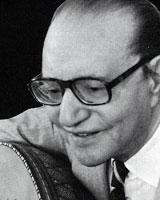Mohammed Abdel Wahab was the most prolific Arabic
composer of his time, responsible for more than a
thousand songs. He personally sang hundreds.
For his
orchestration of the Egyptian national anthem, Anwar
Sadat awarded him the rank of general.
Abdel Wahab was born in 1901 in Cairo. He made his
first recording at the age of 13. In 1924 he was taken
under the wing of Ahmed Shawky, then known as the
Prince of Poets.
Shawky saw to the furthering of Abdel
Wahab's musical and literary education, so that in time
if Shawky was the Prince of Poets, Abdel Wahab was
known as the Singer to Princes and Kings.
In the late 1920s Abdel Wahab wrote traditional
melodies, well suited to Shawky's texts. But as
European rule replaced Ottoman rule, Western influences
affected local music.
In particular, stage musicals in Arabic incorporated
Western elements. In 1926, it fell to Abdel Wahab to
complete a musical left unfinished by the late Said
Darwish, a great composer of the previous generation.
The musical centered on Antony and Cleopatra, and Abdel
Wahab himself played Antony to great acclaim.
After visiting Paris and familiarizing himself with
French musical presentations, Abdel Wahab invented the
Arabic film musical. To a popular culture in which
romantic love was commonly associated with suffering,
Abdel Wahab introduced a romantic hero of light-hearted
wit and urbane sophistication.
His films portrayed a
Westernized social elite and featured music that broke
from tradition. Fellow composers noted that the music
was simplistic compared with Abdel Wahab's previous
work, and Abdel Wahab used lip-synching rather than the
improvisation on which Arabic music had traditionally
relied; but audiences loved it. The film "The White
Flower" was a phenomenon, breaking attendance records.
Abdel Wahab enjoyed introducing new female singers to
the public through his movies; many became stars,
including the great Leila Mourad, who would go on to
produce her own films. Musically, his films continued
controversial, as he began to feature large orchestras
with admixtures of Western instruments. Into his art,
he hybridized Western song forms such as the tango,
samba, and rhumba.
In the 1950s Abdel Wahab left film and concentrated on
his last recordings as a singer, assuming a new and
more serious musical style.
In the 1960s he stopped
singing, but he continued composing for other singers.
It was in 1964 that after years of rivalry at the top
of their profession Om Kalthoum released a record of
his "Ente Omry" written for her to a text by the poet
Ahmad Ramy. Perhaps partly because of its timing--
coinciding with the flowering of Nasserism-- the
recording became Egypt's all-time best-seller. It was
the song the young generation thought of when they
thought of Om Kalthoum, though it was certainly Abdel
Wahab, not Om Kalthoum, who spiced up the orchestration
with an electric guitar.
For many years Abdel Wahab appeared very little in
public, but his popularity never faded.
In 1988, he made a surprise return to the studio,
singing a new composition, and despite lyrics that
seemed unacceptably iconoclastic to some radicals, the
disk sold two million copies.
In 1991, Mohamed Abdel Wahab died of heart failure. His career created a legend in
the world of modern Arabic music and melody.
He composed over 1800 romantic and patriotic songs.
Egypt honored Abdel Wahab with a huge military funeral. The long procession included the Prime and
Foreign Ministers, Ministers of Defense, Interior and Culture, Arab ambassadors and many well know actors,
musicians and singers. The media coverage was equal to that of a major world figure.
Newspapers covered his works for days after his death. Radio and television aired his songs and movies.
With the passing of Abdel Wahab, the Arab world lost the founder of contemporary Arabic music. His work
appealed to both young and old for more than half a century, and continues into the new millennium.
A
banner raised during the funeral procession, which read, best reflects this: "Adieu to Egypt's fourth pyramid".
Click on Menu for other Videos
On studio with Warda
Making of Be Omri Kolo Habeytak
Abdel Wahab on a documentary about Oum Kalthoum's life
